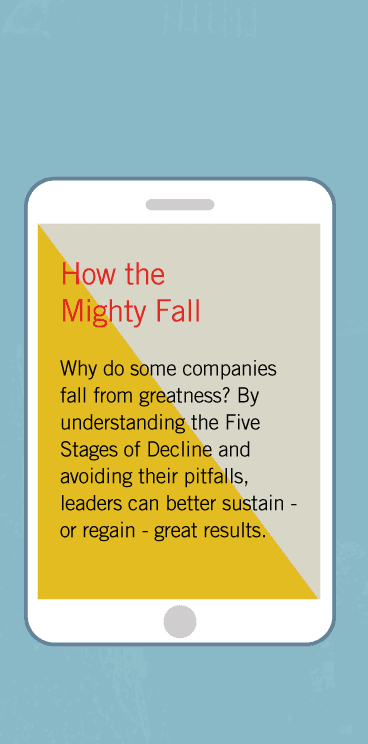Management
"Leaders set the vision; managers just figure out how to get there," said one student.
"Leaders inspire and motivate, whereas managers keep things organized," said another.
"Leaders elevate people to the highest values. Managers manage the details."
The discussion revealed an underlying worship of "leadership" and a disdain for "management." Leaders are inspired. Leaders are large. Leaders are the kids with black leather jackets, sunglasses and sheer unadulterated cool. Managers, well, they're the somewhat nerdy kids, decidedly less interesting, lacking charisma. And of course, we all wanted to be leaders, and leave the drudgery of management to others.
We could not have been more misguided and juvenile in our thinking. As Peter Drucker shows right here, in these pages, the very best leaders are first and foremost effective managers. Those who seek to lead but fail to manage will become either irrelevant or dangerous, not only to their organizations, but to society.
Business and social entrepreneur Bob Buford once observed that Drucker contributed as much to the triumph of free society as any other individual. I agree. For free society to function we must have high-performing, self-governed institutions in every sector, not just in business, but equally in the social sectors. Without that, as Drucker himself pointed out, the only workable alternative is totalitarian tyranny. Strong institutions, in turn, depend directly on excellent management, and no individual had a greater impact on the practice of management and no single book captures its essence better than his seminal text, Management.
My first encounter with Drucker's impact came at Stanford in the early 1990's, when Jerry Porras and I researched the great corporations of the twentieth century. The more we dug into the formative stages and inflection points of companies like General Electric, Johnson & Johnson, Procter & Gamble, Hewlett-Packard, Merck and Motorola, the more we saw Drucker's intellectual fingerprints. David Packard's notes and speeches from the foundation years at HP so mirrored Drucker's writings that I conjured an image of Packard giving management sermons with a classic Drucker text in hand. When we finished our research, Jerry and I struggled to name our book, rejecting more than 100 titles. Finally in frustration I blurted, "Why don't we just name it Drucker Was Right, and we're done!" (We later named the book Built to Last.)
What accounts for Drucker's enormous impact? I believe the answer lies not just in his specific ideas, but in his entire approach to ideas, composed of four elements:
- He looked out the window, not in the mirror
- He started first—and always—with results
- He asked audacious questions
- He infused all his work with a concern and compassion for the individual.
I once had a conversation with a faculty colleague about the thinkers who had influenced us. I mentioned Drucker. My colleague wrinkled his nose, and said: "Drucker? But he's so practical." Drucker would have loved that moment of disdain, reveling in being criticized for the fact that his ideas worked. They worked because he derived them by precise observation of empirical facts. He pushed always to look out there, in the world, to derive ideas, challenging himself and his students to "Look out the window, not in the mirror!" Drucker falls in line with thinkers like Darwin, Freud and Taylor—empiricists all. Darwin wrote copious notebooks, pages and pages about pigeons and turtles. Freud used his therapeutic practice as a laboratory. Taylor conducted empirical experiments, systematically tracking thousands of details. Like them, Drucker immersed himself in empirical facts and then asked, "What underlying principle explains these facts, and how can we harness that principle?"
Drucker belonged to the church of results. Instead of starting with an almost religious belief in a particular category of answers—a belief in leadership, or culture, or information, or innovation, or decentralization, or marketing, or strategy, or any other category—Drucker began first with the question "what accounts for superior results?" and then derived answers. He started with the outputs—the definitions and markers of success—and worked to discover the inputs, not the other way around. And then he preached the religion of results to his students and clients, not just to business corporations but equally to government and the social sectors. The more noble your mission, the more he demanded: what will define superior performance? "Good intentions," he would seemingly yell without ever raising his voice, "are no excuse for incompetence."
And yet while practical and empirical, Drucker never became technical or trivial, nor did he succumb to the trend in modern academia to answer (in the words of the late John Gardner) "questions of increasing irrelevance with increasing precision." By remaining a professor of management—not as a science, but as a liberal art—he gave himself the freedom to pursue audacious questions. My first reading of Drucker came on vacation in Monterey, California. My wife and I embarked on one of our adventure walks through a used book store, treasure hunting for unexpected gems. I came across a beaten-up, dog-eared copy of Concept of the Corporation, expecting a tutorial on how to build a company. But within a few pages, I realized that it asked a much bigger question: what is the proper role of the corporation at this stage of civilization? Drucker had been invited to observe General Motors from the inside, and the more he saw, the more disturbed he became. In the end, he deemed GM—then perhaps the most powerful corporation in the world—a failure. "General Motors... can be seen as the triumph and failure of the technocrat manager," he later wrote. "In terms of sales and profits [GM] has succeeded admirably . . . But it has also failed abysmally—in terms of public reputation, of public esteem, or acceptance by the public." Drucker passionately believed in management not as a technocratic exercise, but as a profession with a noble calling, just like the very best of medicine and law.
Drucker could be acerbic and impatient, a curmudgeon. But behind the prickly surface, and behind every page in his works, stands a man with tremendous compassion for the individual. He sought not just to make our economy more productive, but to make all of society more productive and more humane. To view other human beings as merely a means to an end, rather than as ends in themselves, struck Drucker as profoundly immoral. And as much as he wrote about institutions and society, I believe that he cared most deeply about the individual.
I personally experienced Drucker's concern and compassion in 1994, when I found myself at a crossroads, trying to decide whether to jettison a traditional path in favor of carving my own. I mentioned to an editor for Industry Week that I admired Peter Drucker. "I recently interviewed Peter," he said, "and I'd be happy to ask if he'd be willing to spend some time with you."
I never expected anything to come of it, but one day I got a message on my answering machine. "This is Peter Drucker"—slow, deliberate, in an Austrian accent—"I would be very pleased to spend a day with you, Mr. Collins. Please give me a call." We set a date for December, and I flew to Claremont, California. Drucker welcomed me into his home, enveloping my extended hand into two of his. "Mr. Collins, so very pleased to meet you. Please come inside." He invested the better part of a day sitting in his favorite wicker chair, asking questions, teaching, guiding and challenging. I made a pilgrimage to Claremont seeking wisdom from the greatest management thinker, and I came away feeling that I'd met a compassionate and generous human being who - almost as a side benefit - was a prolific genius.
There are two ways to change the world: the pen (the use of ideas) and the sword (the use of power). Drucker chose the pen, and thereby rewired the brains of thousands who carry the sword. Those who choose the pen have an advantage over those who wield the sword: the written word never dies. If you never had the privilege to meet Peter Drucker during his lifetime, you can get to know him in these pages. You can converse with him. You can write notes to him in the margins. You can argue with him, be irritated by him, and inspired. He can mentor you, if you let him, teach you, challenge you, change you—and through you, the world you touch.
Peter Drucker shined a light in a dark and chaotic world, and his words remain as relevant today as when he banged them out on his cranky typewriter decades ago. They deserve to be read by every person of responsibility, now, tomorrow, ten years from now, fifty and a hundred. That free society triumphed in the twentieth century guarantees nothing about its triumph in the twenty-first; centralized tyranny remains a potent rival, and the weight of history is not on our side. When young people ask, "What can I do to make a difference?" one of the best answers lies right here in this book. Get your hands on an organization aligned with your passion, if not in business, then in the social sectors. If you can't find one, start one. And then lead it—through the practice of management—to deliver extraordinary results and to make such a distinctive impact that you multiply your own impact by a thousand-fold.
Jim Collins
Boulder, Colorado
December, 2007






